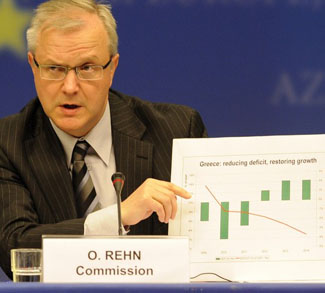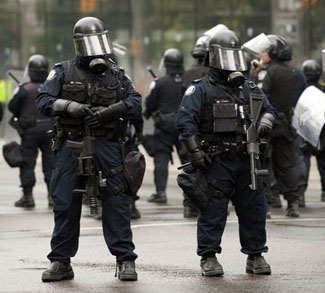FORECAST
Despite an announcement of a massive bailout, the future of the Greek economy- and by extension the entire euro zone as well- is now more at risk than ever.
Several months ago, bond vigilantes swept into the Greek bond market, giving rise to market volatility and whispers of a Greek default; the Euro Financial Crisis was born. Since then, events have only served to deepen the severity of economic gloom, whether in the form of reports of Greek guile in reporting budget numbers, political marches and riots in Athens, or the somewhat slow and divided response from the IMF and EU heavyweights over how to avoid a much-dreaded default.
Now it has come to light that the IMF and EU will be extending a bailout to the Greek government to the tune of around 110 billion euros. It is safe to assume that these funds will be lent at around 5% interest- far lower than the towering rates that the Greek government is presently forced to pay on the open market. The bailout will also have some substantial strings attached to it in the form of a package of austerity measures that the Greek government must implement. The package is reportedly aiming to cut the Greek deficit by 10 percent before the end of 2011- a quixotic goal if there ever was one.
It’s important to note that the 110 billion euro lifeline that is being thrown to the Greek government is merely enough to keep over the default line through 2011. The funds will cover the Greek budget shortfall and pay off maturing debts, but little else. There is no guarantee that a liquidity injection to avoid default won’t become a bi-annual affair given the fact that the Greek economy’s struggles are far from over.
Even the most optimistic economist would have a hard time imagining that the Greek government will be able to slash its budget deficit by 10 percent in a mere two years. The Greek economy is still reeling from the 2008 global financial crisis, and the sudden, wholesale reigning-in of public spending that austerity packages call for will only serve to deepen recession. A shrinking economy, declining public revenue, and the absence of the levers that a monetary policy affords a government- all of these factors point to political instability and a deepening fiscal crisis moving forward.
Since it’s fairly clear that Greece won’t be making the 10 percent target, the real question becomes the degree by which it will miss the mark. The answer to this question is likely the difference between a public default and ‘red card’ for Greece and a perpetual lifeline of bailouts until Athens claws itself back within the 3 percent deficit range envisioned by the Stability & Growth Pact.
The sovereign wealth crisis buzzing around the PIGS countries has revealed a serious structural weakness within the euro zone. To put it simply, there is presently no way that the EU can enforce compliance to the 3 percent ceiling envisioned by the Stability & Growth Pact. Since there are no institutional solutions and the crisis is serious enough to permanently harm the viability of the euro, it’s quite possible that drastic measures may be taken such as a temporary or permanent expulsion of offending countries from the euro zone.
Moreover, with the long and laborious struggle to ratify the Lisbon Treaty still fresh in the memories of many member-states, there is little political will to re-open the debate on reform. This means that the EU heavyweights like Germany, France, and the United Kingdom- the states that will be on the hook for paying to bail out Greece and perhaps soon Portugal- will be far less inclined to extend a permanent line of credit given the lack of any guarantees that this kind of crisis won’t soon be happening again.
In sum, the Greek government is on a short leash, and if it doesn’t behave by immaculately in implementing its’ austerity package, it runs the risk of being cut loose.
SUMMARY OF EVENTS: April 26th – May 3rd, 2010
NORTH AMERICA
United States
Goldman Sachs is under criminal investigation for the way in which it sold complex mortgage-backed products to clients, reports suggest.
As senator, Barack Obama called the Bush Administration’s warrantless wiretapping program illegal, and demanded greater transparency from government.
The US military has joined efforts to stop an oil leak in the Gulf of Mexico as fears rise about its scale.
Officials are considering setting fire to an oil spill in the Gulf of Mexico as efforts to stem a leak from a rig that exploded and sank are failing.
CENTRAL AMERICA & THE CARIBBEAN
Cuba
Cuba challenged the United States Sunday to lift a decades-old trade embargo “even for a year” to test its contention that the island’s leaders do not want the embargo lifted or normal relations with Washington.
Panama
U.S. Secretary of State Hillary Rodham Clinton has signed a warrant on the extradition of former Panamanian leader Manuel Noriega to France, the State Department said on Monday.
WESTERN EUROPE
Greece
Protesters in Athens clashed with police as a group tried to force its way into the Greek finance ministry.
The European Union (EU) is on the verge of agreeing the details of an emergency plan to rescue Greece’s economy, a senior official has said.
European markets have continued to fall heavily amid speculation over the future of the Greek economy.
MIDDLE EAST
Iran
Iranian Foreign Minister Manouchehr Mottaki said on Sunday that Iran is willing to consider enriching uranium in other countries as suggested by the International Atomic Energy Agency (IAEA).
Iran expects exports to Iraq will exceed $8 billion in 2010, up from $6 billion in 2009, boosted by equipment and materials for the war-damaged country’s reconstruction, an Iranian diplomat said on Sunday.
SOUTH ASIA
Pakistan
The Special Investigation Group of the FIA, which has been asked to fix criminal responsibility in the Benazir Bhutto assassination case, has conducted the DNA test of the suicide bomber and the result matched the blood samples taken from his shoes found by investigators from the residence of the ‘facilitator’.
The leader of the Pakistan Taliban, Hakimullah Mehsud is believed to have survived a US missile strike earlier this year, contradicting reports he was killed.
Taliban militants have resumed targeted killings of local leaders in Pakistan’s troubled Swat valley, officials have told the BBC.
Pakistan’s former military ruler Pervez Musharraf is planning to launch a political party in a comeback bid two years after he was unseated in elections, officials said Wednesday.
Three missiles fired by U.S. drone aircraft struck a militant compound in Pakistan’s North Waziristan region near the Afghan border on Monday, killing five militants, intelligence officials said.
Thailand
The anti-government “red-shirts” will hold a new rally on Tuesday in order to pressure the government, a core leader said Monday.
EAST ASIA
China
China suffered its third lethal attack on a kindergarten in three days, after a farmer injured five children with a hammer in the north of the country before setting himself on fire.
AFRICA
Chad
Chad’s government says the army has killed 105 insurgents and beaten back a new attack near the Sudan border, but the rebels have denied the claims.
Somalia
At least 14 civilians have been killed during a battle between government soldiers and al-Qaeda-linked fighters, witnesses say.
Niger
An increasingly desperate search for food is driving a mass exodus from parched agricultural land in western Africa’s Sahel region where the UN says up to 10 million people face hunger.
Sudan
Fifty-five members of a Darfuri tribe have been killed and at least 85 have been wounded in a clash with soldiers from Southern Sudan’s army, the BBC has said, quoting a tribal spokesmen.
ARCTIC
Norway and Russia have resolved a four-decade struggle over contested borders beneath the Barents Sea and Arctic Ocean, opening the area for development




